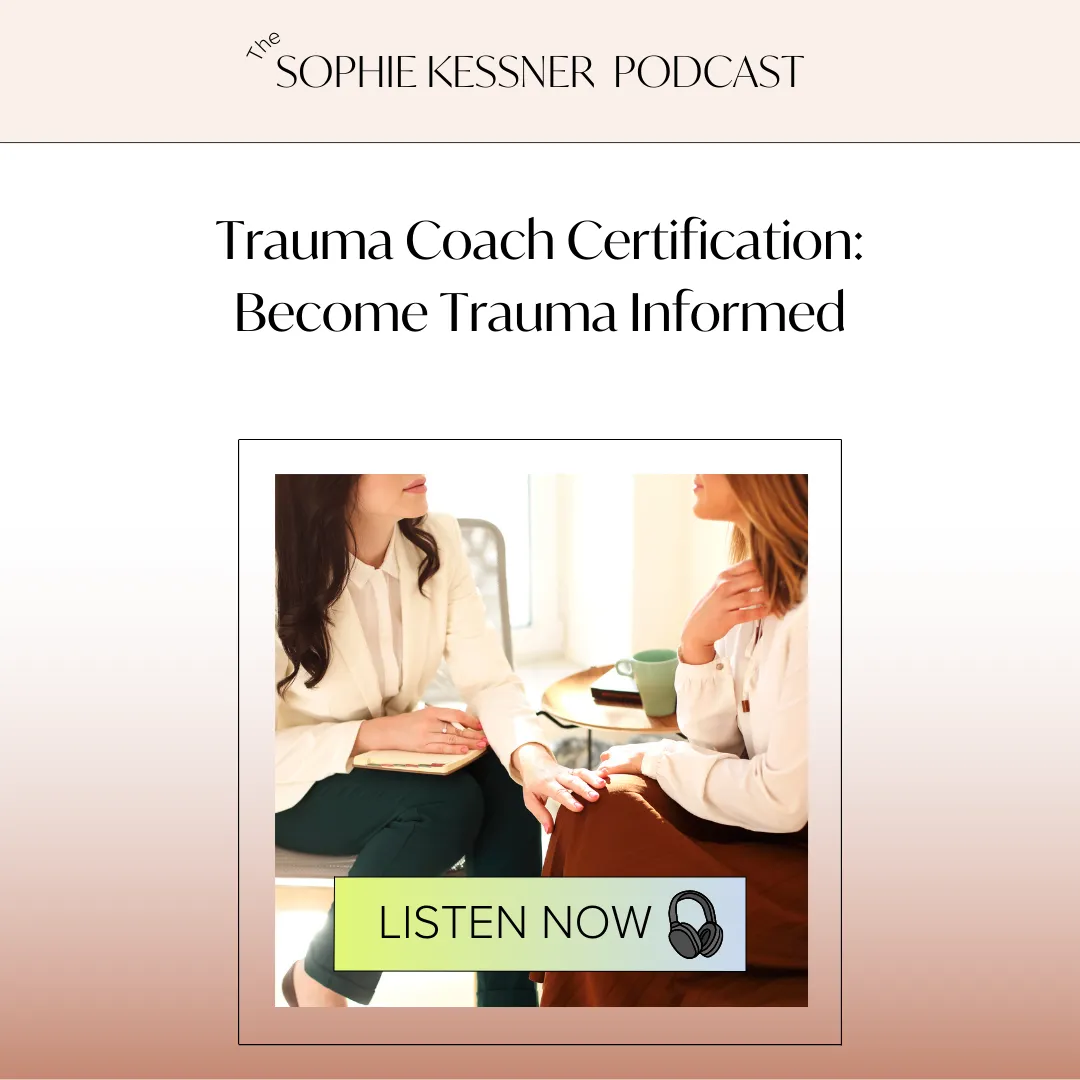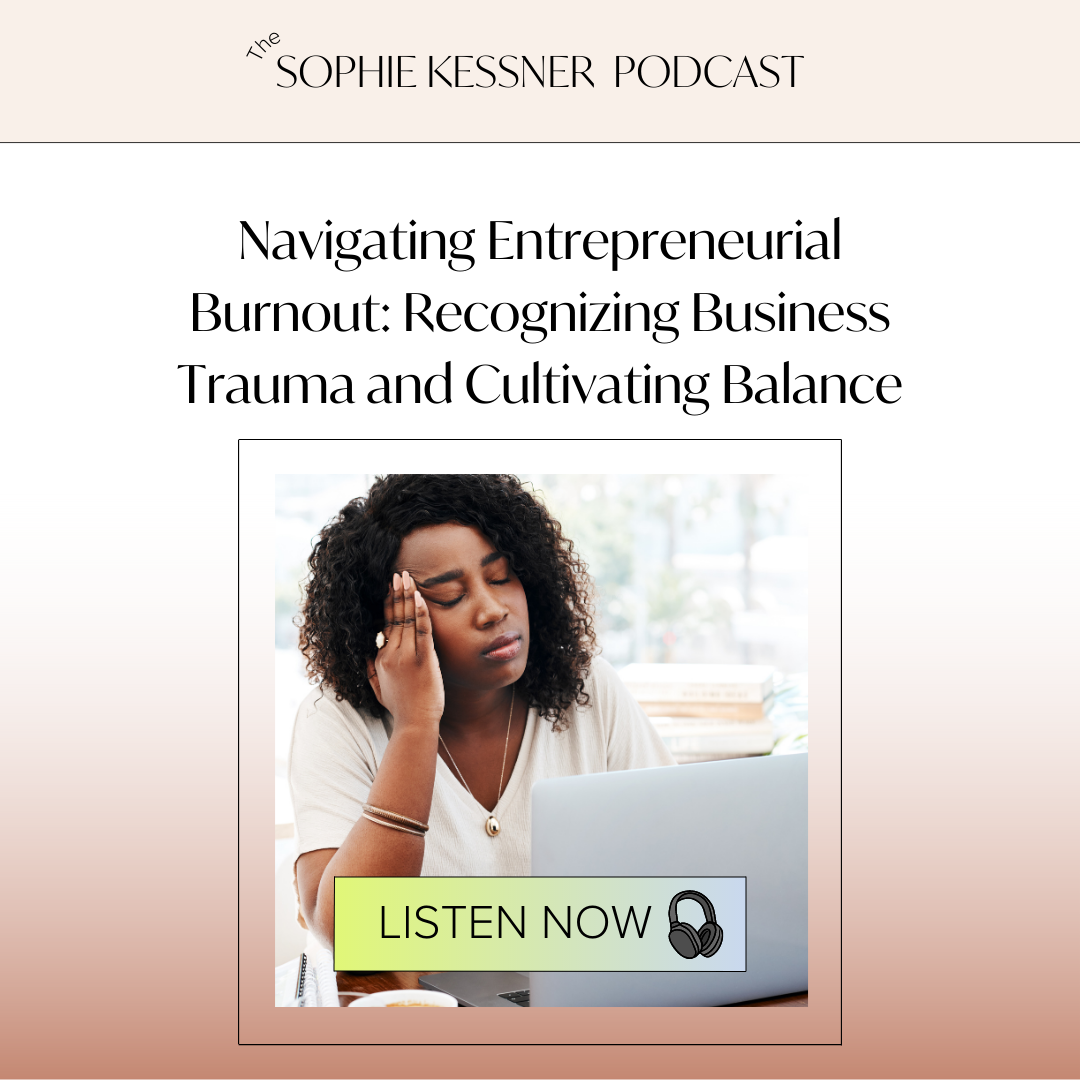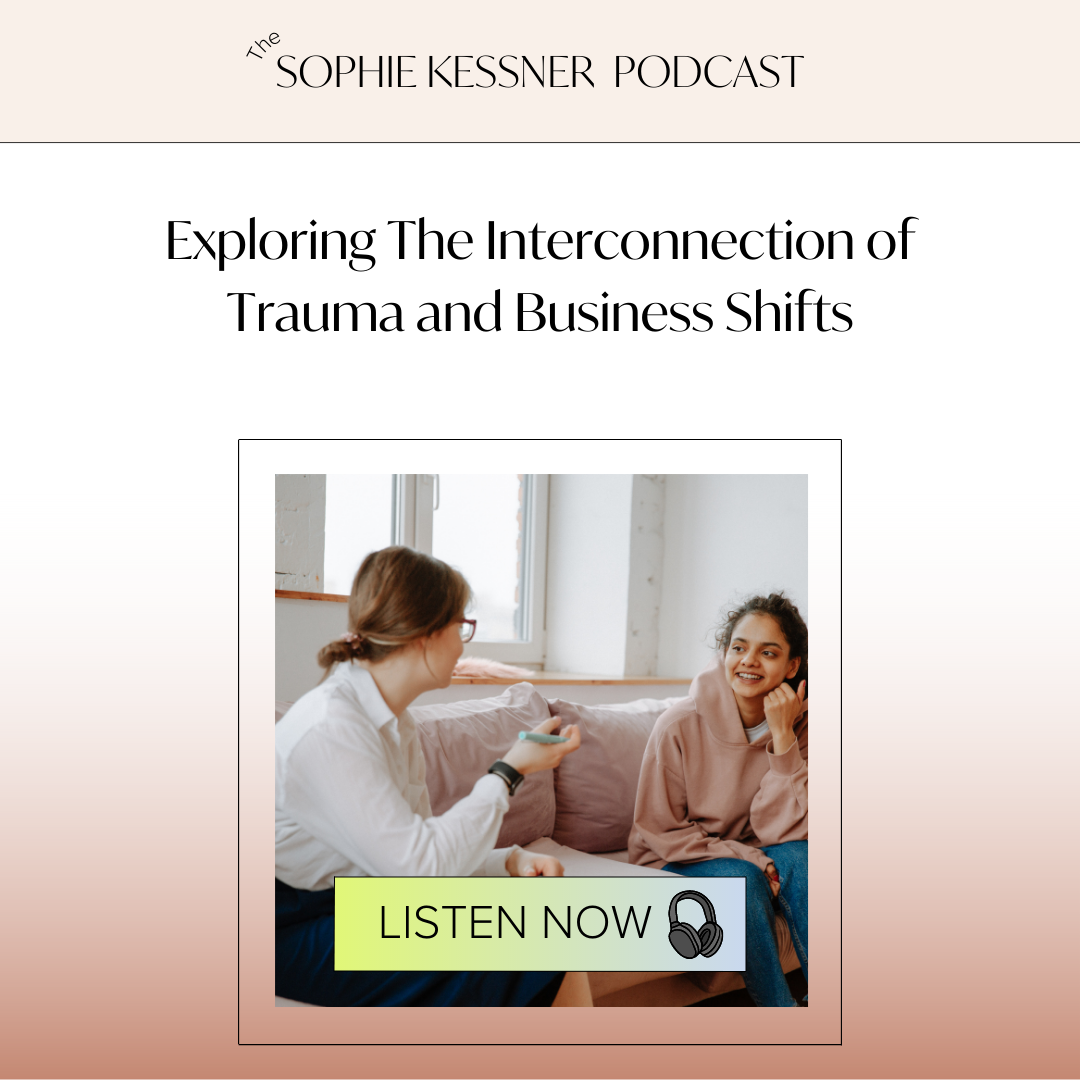The Importance of Trauma informed Coaching
Are you looking for a trauma coach certification or want to become a trauma informed coach? The most recent studies show that more than 5.2 million Americans are living with Post Traumatic Stress Disorder 70% of Americans suffer a traumatic event in their lifetime 27% percent of those with PTSD attempt suicide Trauma changes lives.
Trauma has a significant impact on a survivor’s emotional and physical health. Many develop PTSD, which changes the way they relate to themselves and the world around them. Other survivors also battle depression, anxiety, and insomnia.
Trauma Coach Resources Mentioned on This Podcast Episode
- Trauma in Business Podcast Episode
- Navigating Entrepreneurial Burnout Episode
- Exploring the interconnections of Trauma and Business Episode
Trauma Coaching Versus Life Coaching
With the increased popularity of coaching over the last few decades, and the roar of social media continuing to amplify the conversations around the nervous system, trauma, and trauma recovery, clients AND coaches need to do their research in understanding the differences between trauma recovery work and traditional coaching skills.
Though some clients prefer certified coaches, most clients looking for a life coach believe that self love, affirmations, and mindset work is adequate for trauma recovery.
The Gap in Traditional Coaching
The average life coach is well-intentioned in their desire to support clients on their trauma recovery journey but may find their coaching strategies falling short when it comes to trauma recovery. That’s why clients and coaches alike need to understand the distinction between a life coach and trauma-informed coach for their trauma clients to have the best outcomes possible.
This growing gap in the industry calls for an evolution of the life coach into a trauma informed coach who has a thorough understanding of the trauma recovery process, how trauma works, the brain body connection, along with an in depth understanding of the nervous system
What is Trauma Coaching?
Trauma coaching is a specialty that focuses on the healing journey of trauma survivors. Trauma coaches are trained to understand how traumatic experiences can change people’s feelings, thoughts, and behaviors. They are experts in helping clients create a safe space to not only identify their triggers but learn coping mechanisms to help them manage their difficulties holistically.
What is life coaching?
This is a relatively new form of personal or professional development. It is an ongoing relationship between the client and the coach that helps to create positive change in their lives.
What is the goal of life coaching?
Life coaches help clients identify their goals, develop action plans to achieve them, and provide support along the way.
This form of coaching differs from therapy in that it focuses on achieving specific goals and is more action-oriented than therapy and tends to focus on the process of self discovery through goal setting.
What’s the difference between a life coach and a coach trained in trauma?
The primary difference between a life coach and a trauma informed coach is the focus on healing from past traumas. Trauma coaches recognize the need to look beyond goal setting and positive thinking for long-term and sustainable emotional healing.
This holistic approach takes into account the lived experience of those who are experiencing PTSD or complex trauma, that may show up as panic attacks, chronic depression or other symptoms of trauma providing support and guidance through the healing journey.
Trauma Informed Coaching Certification versus Trauma Recovery Coaching
Though there are plenty of ways to obtain certification as a trauma informed coach through the plethora of other programs or coaching certifications, in the realm of trauma healing, it’s crucial to find helping professionals who are more than just a trauma coach or life coach and have done substantial training in trauma recovery coaching, trauma informed care, and ideally, have work with some form of ICF accreditation trauma informed coach training or other trauma-trainings that deals with the nuances of complex trauma and the delicate healing journey that lies ahead for all adult survivors or abuse survivors.
Trauma Trained Versus Trauma-Informed coaching for trauma victims
Being trauma-informed means having an understanding of the impact that trauma can have on individuals and communities. It involves recognizing the signs and symptoms of trauma and working to create a safe and supportive environment for people who have experienced trauma.
On the other hand, being trauma-trained means having specialized training in treating trauma and its effects.
What makes someone a trauma-trained professional?
A trauma-trained professional or other certified clinical trauma professional has received specialized education and training in evidence-based treatments for trauma, such as Trauma-Focused Cognitive Behavioral Therapy (TF-CBT), Eye Movement Desensitization and Reprocessing (EMDR), or Somatic Experiencing (SE).
While being trauma-informed is a great first step, it’s imperative to work with a trauma-trained professional when dealing with more intense trauma responses. This is because trauma responses can be complex and multifaceted, and they require a nuanced understanding of the various factors that contribute to trauma.
A trauma-informed coach is not necessarily trained to treat trauma and may not have the coaching skills required to support the trauma recovery process for clients who have a severe mental illness, chronic childhood trauma that needs attention.
For example, trauma responses may involve physiological changes in the body, such as an increase in heart rate or changes in breathing patterns.
A trauma-trained professional understands these changes and can help clients develop strategies for regulating their bodies and managing their emotions as a way of developing client regulation.
Additionally, trauma responses may be triggered by specific events, people, or situations that are associated with the trauma. A trauma-trained professional can help clients identify these triggers and develop coping strategies for managing them.
When to see a medical professional
In the case of a mental crisis when self loathing, self harm, drug addiction or other more serious symptoms show up, it’s important to connect with other licensed medical professionals who have advanced training to support survivors in dealing with the subsequent symptoms of trauma, ideally finding a professional who specializes in the field of the trauma whether it be domestic violence, family therapy, or other forms of clinically diagnosed mental illness.
Finally, trauma responses may involve complex emotions and thought patterns, such as feelings of shame, guilt, or self-blame. A trauma-trained professional can help clients work through these emotions and develop a more compassionate and understanding relationship with themselves.
Working with a Trauma-Trained Professional:
In short, while being trauma-informed is an important first step in creating a safe and supportive environment for people who have experienced trauma, it’s essential to work with a trauma-trained professional when dealing with more intense trauma responses.
By doing so, you can ensure that you have the knowledge and skills needed to help clients navigate the complexities of trauma and build a brighter future for themselves.
You can learn more about Soph’s training and background in trauma work at Trauma Coaching With Soph or find a certified Somatic Experiencing Practitioner on the directory at: https://directory.traumahealing.org/ where you can search for “a trauma coach near me” who has been accredited through the Somatic Experiencing international association.
Somatic Experiencing Institute Advanced Certification
SEI is Dr. Peter Levine’s international association dedicated to trauma survivors and working with the brain body connection to help coaches and trauma clients move from shock, fear, and other emotions to a healthy life that is post-trauma.
SEI provides advanced certification for trauma work with both in person courses or online learning opportunities.
This includes a life changing three year long training program to become a trauma trained professional Somatic Practitioner, as well as many other specific courses that focus on how to work with complex trauma along with teaching trauma related courses to help any individual overcome their own traumatic history.
This extensive training was originally developed for clinical psychologists, social workers, and other mental health professionals who work initially with trauma survivors and understand the leading causes of trauma but has become available to a wider variety of service providers including the trauma coach who is eager to understand their own trauma along with that of their clients.
SEI has one of the highest ratings for ethical standards and a robust curriculum to help students master the core competencies required to be considered a trauma-recovery coach and provide coaching services that better support clients in healing from past trauma.
NeuroAffective Touch Practitioner Training
NeuroAffective Touch (NAT) is a somatic therapy that uses gentle touch to help trauma survivors access the body’s regulatory systems and support them in healing from past traumas. With its roots in neuroscience, NAT works with the nervous system to move stuck emotions and assist clients as they explore their physical sensations while providing an environment of safety and support.
NAT practitioners have extensive training in understanding the nervous system, how to effectively apply neuroaffective touch, and how to create a safe space for clients to explore their trauma-related emotions. NAT is an effective treatment for both acute and complex trauma due to its ability to work with the body’s natural regulatory systems and help clients move away from fear, anxiety, and other overwhelming emotions which is an optimal approach when navigating childhood trauma.
Both NAT and SE certifications encourage students to practice in coaching triads and take turns both practicing and experiencing the work on their way to becoming fully certified trauma coach.
Trauma & Somatics Trauma informed coaching certification
Trauma and Somatics is a 35 hour personal development program and coaching certification that will dive deep into the fundamentals of trauma and provides coaching strategies along with trauma informed practices to helps coaches and other practitioners become simply aware of the ways a traumatic event can impact ones own life and how the coaching process can be used to help shift the behavioral reaction a client may be experiencing as a side effect of past trauma.
It’s important to reiterate that becoming a trauma informed coach or a life coach with an understanding of the nervous system doesnot qualify an individual to treat trauma but rather, ensures they are simply aware of HOW trauma may show up with clients they work with inside their coaching business.
The coaching certification to become a trauma informed practitioner is what will allows certified coaches to create a safe environment for their clients and use the tools within their coaching process to help regulate the nervous system as they continue to focus on their primary skill of life coaching or other.
What’s the difference between a Trauma Informed Coach Versus a Trauma Recovery Coach?
While both trauma informed coaching and trauma recovery coaching utilize the same basic principles to create a space for clients who have experienced trauma, there is an important distinction to be made between the two.
Trauma informed coaching focuses on creating a supportive environment and providing educational resources that help traumatized individuals learn to self-regulate, while trauma recovery coaching focuses on the actual healing process of a client’s past trauma.
Trauma recovery coaching is typically conducted by a certified and experienced Somatic Experiencing Practitioner who is knowledgeable about the physical, cognitive, emotional, behavioral, and spiritual effects of trauma and can guide their clients through an individualized treatment plan that includes talk therapy, body-oriented approaches and other activities that are designed to help the client heal.
Trauma informed coaching is more focused on providing helpful resources and insights into how trauma can impact a person’s life without actually treating the traumas of the individual.
The emphasis is on creating an atmosphere of support and understanding so that clients feel safe to explore and heal from their traumatic experiences.
What is the scope of practice for trauma informed coaches?
In short, a trauma informed coach is not qualified to treat trauma or diagnose mental health conditions. The scope of practice for the trauma informed coaches is limited to providing emotional support and helping clients develop self-regulating skills to better manage their emotions and behaviors so they can cope more effectively with any future stressors that may arise as a result of past trauma.
How do trauma informed coaches help their clients?
In addition to providing emotional support, the scope of practice for a trauma informed coach includes helping clients gain insight into their past experiences and how they can affect their present life, exploring potential triggers and strategies to manage them, building self-esteem and confidence, exploring personal values and setting goals in alignment with those values, and developing communication skills to help clients better express themselves.
Overall, trauma informed coaches provide a safe and supportive environment for their clients while they gain insight into the root of their trauma and develop skills to manage challenging emotions and behaviors.
What is the goal of trauma informed coaching?
The ultimate goal of this work is to help clients live a more empowered life despite any past traumatic experiences they have endured. This work is not meant to replace traditional psychotherapy or other medical treatments for trauma, but rather, it is meant to be an adjunct therapy that can help clients move through their healing process and create a more fulfilling life.
What is the scope of trauma coaching?
The scope of trauma coaching is to help individuals heal and move forward from their traumatic experiences. Trauma coaches are trained in therapeutic techniques that address the emotional, physical, cognitive, and spiritual/energetic aspects of trauma so that clients can understand how it has been affecting their lives and how to create new coping strategies.
How do trauma coaches help their clients?
Trauma coaches help their clients identify and process any underlying feelings related to the trauma, develop more adaptive coping skills, build resilience in order to better manage future stressors, and gain insight into how past traumas have shaped current beliefs. Trauma coaching also emphasizes setting healthy boundaries and developing self-compassion as a way of empowering individuals to take charge of their own healing process.
What is the main goal of a trauma coach?
The goal of trauma coaching is to help clients create a healthier relationship with themselves, develop more adaptive coping strategies, and become empowered to move through life with greater resilience and hope. Ultimately, the objective of trauma coaching is to help individuals heal from past traumas so they can live a more fulfilling life.
Do I need a Coaching Certification for my Coaching business?
Yes, it is recommended to get a coaching certification in order to best serve your clients and increase their trust in you. A professional coach certification from an accredited institution demonstrates that you have the knowledge and experience needed to provide high-quality services to your clientele. Most certifications will also include specialized training in trauma informed coaching or other areas of focus depending on the needs of your clients.
How does a coaching certification help me?
Having a coaching certification also provides you with credibility and can help differentiate you from other coaches in the field. Additionally, many certifying organizations offer additional resources such as mentorship programs and continuing education opportunities which can be valuable to further your professional development in trauma informed coaching or any specialty area of focus.
Therefore, having a coaching certification is highly recommended for anyone who wishes to establish a credible coaching practice and provide the highest quality services to their clients.
Somatics With Soph
Somatics with Soph is my private practice as a trauma coach supporting clients dealing with the lasting symptoms of both shock-trauma and that of chronic-trauma stemming from neglect or abuse.
I am trained through both the Somatic Experiencing Institute along with my ongoing professional development through the NeuroAffective Touch Institute and have completed multiple trauma-informed coaching certifications with an extensive amount of clinical hours under supervision.
If you’d like to learn more about my private practice, you can go to: somaticwithsoph.com
Conclusion:
Trauma coaching is an effective approach to helping individuals heal from trauma and create a life of greater resilience and fulfillment.
A professional certification in trauma coaching can help demonstrate your expertise and provide you with additional resources for continuing education in this important field. Somatics With Soph is my private practice as a trauma coach providing individual support to those dealing with the lasting effects of traumatic experiences.
SEI provides specialized training to become a certified trauma recovery coach and trauma informed practitioner, helping entrepreneurs navigate the complex space of trauma with skill and confidence. With this certification, coaches can create a safe environment for their clients and use the tools within their coaching process to help regulate the nervous system as they continue to focus on their primary skills of life coaching or business coaching.












